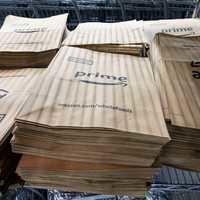Millions Of Hungry Americans Turn To Food Banks For First Time
Image Source: AP Photo
During the worst of the pandemic, U.S. unemployment skyrocketed to 14.7%, a rate not seen in almost a century. Millions turned to food banks to feed their families, and in late March, 20% of the country's food banks almost ran out of food, according to Feeding America, the nation’s largest anti-hunger organization. The supply problem has since subsided but demand has not. The organization handed out 4.2 billion meals from March through October, more than ever in its 40-year history. It also found that 4 in 10 visitors are first timers. The Food Research & Action Center, another an anti-hunger organization, also found that 40% of visitors had annual incomes above $50,000 before the outbreak. Many relatively well-off Americans have sought hunger relief this year. As the pandemic continues, Feeding America anticipates the number of those going hungry to swell to at least 50 million Americans.

More Supply Chain News
Hershey Upends Cocoa Market By Sourcing Beans From Futures Market Instead Of From Traders
Image Source: Whole Foods Market
Back in April, the USDA tested a pilot program making it easier for food stamp recipients to buy groceries online during the pandemic. Now 1.1 million households use the service each month, a boon to everyone adhering to social distancing guidelines. It's also been a huge payday for e-commerce giants Amazon and Walmart, the only two grocery retailers to participate in the program in most states. Given that food stamp recipients spent a whopping $55 billion on groceries in 2019, the USDA's pilot program has taken a big bite out of revenue at regional and local grocery stores. Some market analysts say that's a solid reason to end the program when the pandemic ends.

Pilgrim’s Pride To Pay $110.5 Million Fine For Chicken Price Fixing In Justice Department Plea Deal
Chicken processing giant Pilgrim’s Pride agreed to pay a $110.5 million penalty for curtailing competition in the poultry market. The agreement is among the first results in a long-running government investigation, as nearly 40 lawsuits have been filed by grocers, restaurants and others. Colorado-based Pilgrim's Pride is a division of meatpacker JBS USA and processes about one out of every five chickens in the US market.

Meat Prices Drop As Supplies Rebound
Image Source: Angus Mordant / Bloomberg News
Ground beef and pork loin prices have returned to pre-pandemic levels. Prime rib and chicken wings are even cheaper than before the pandemic began. In September, prime rib sold for $7.15 a pound, down more than 11% since the beginning of the year. New York strip prices are about 8% lower, and beef brisket prices have fallen nearly 20%. U.S. Department of Agriculture figures show that meat processing has not only resumed but is now largely exceeding year-over-year levels. Despite production increases, Tyson Foods estimates that about 1 million cattle and 3 million hogs remain backed up on U.S. feedlots and farms due to prior slaughterhouse shutdowns.
